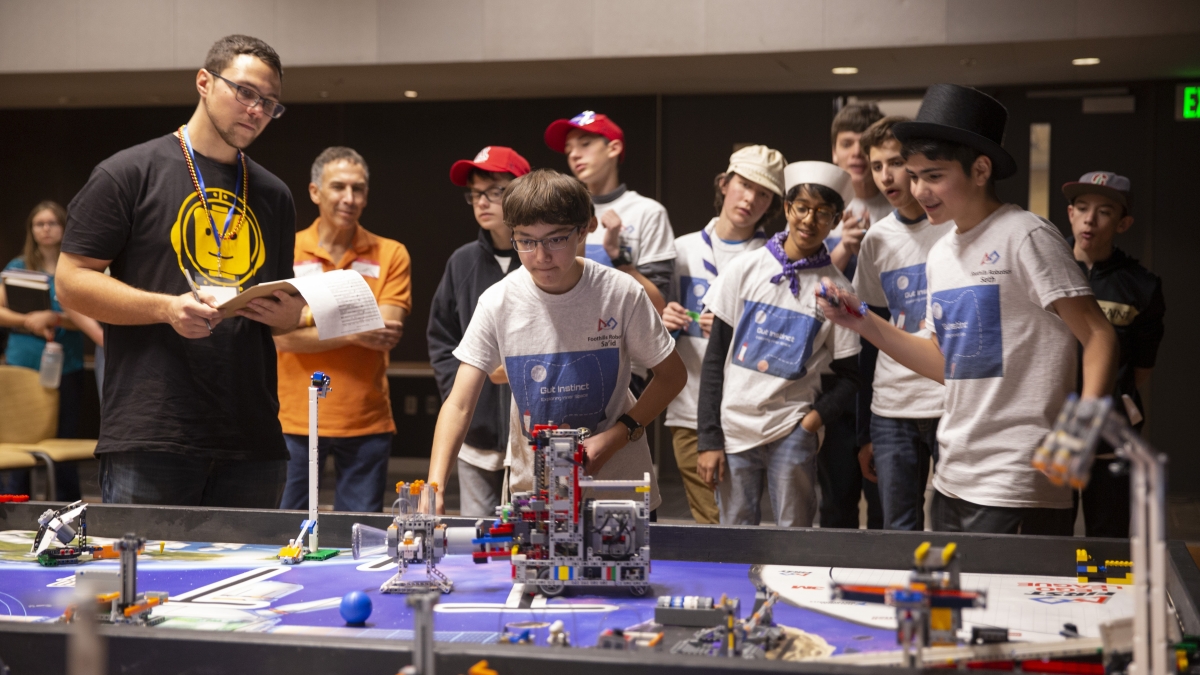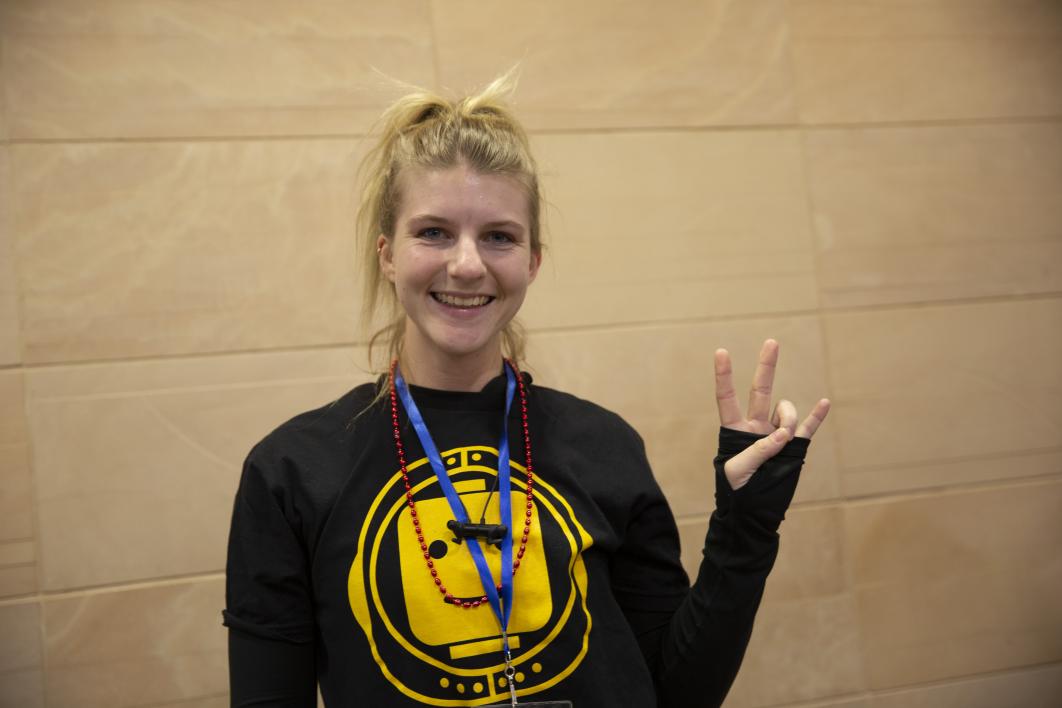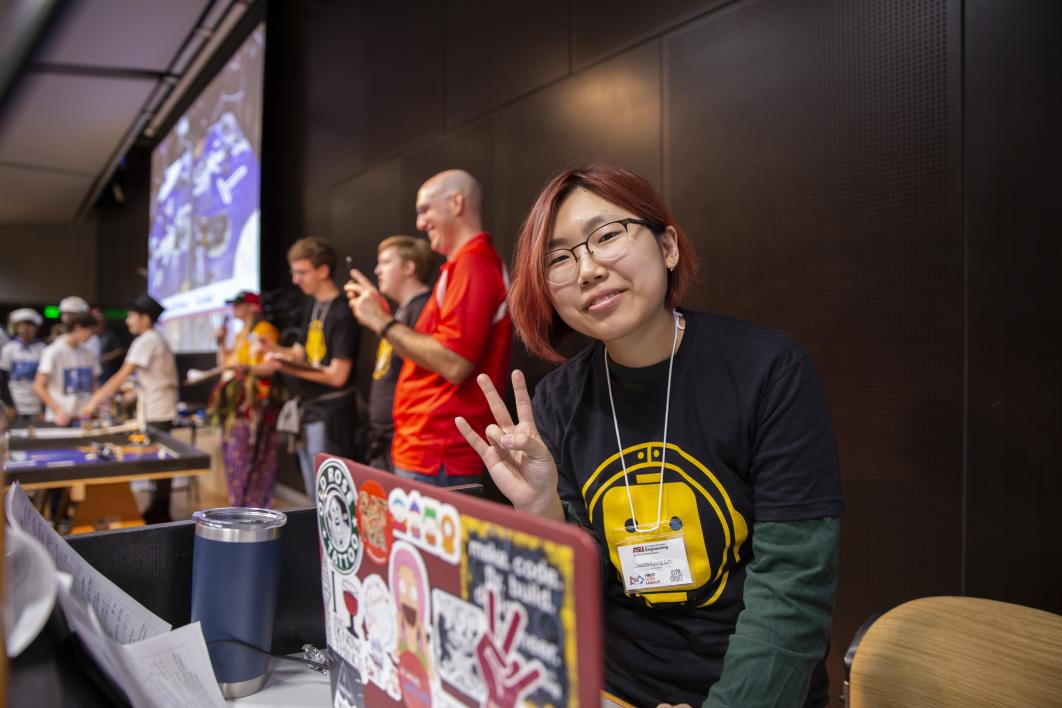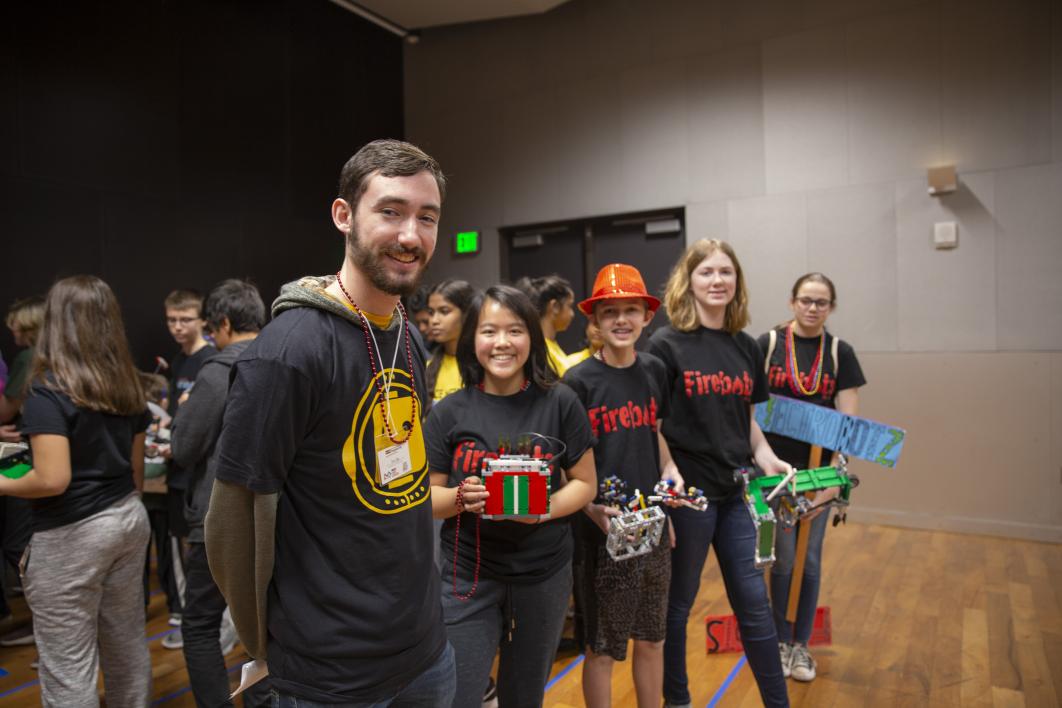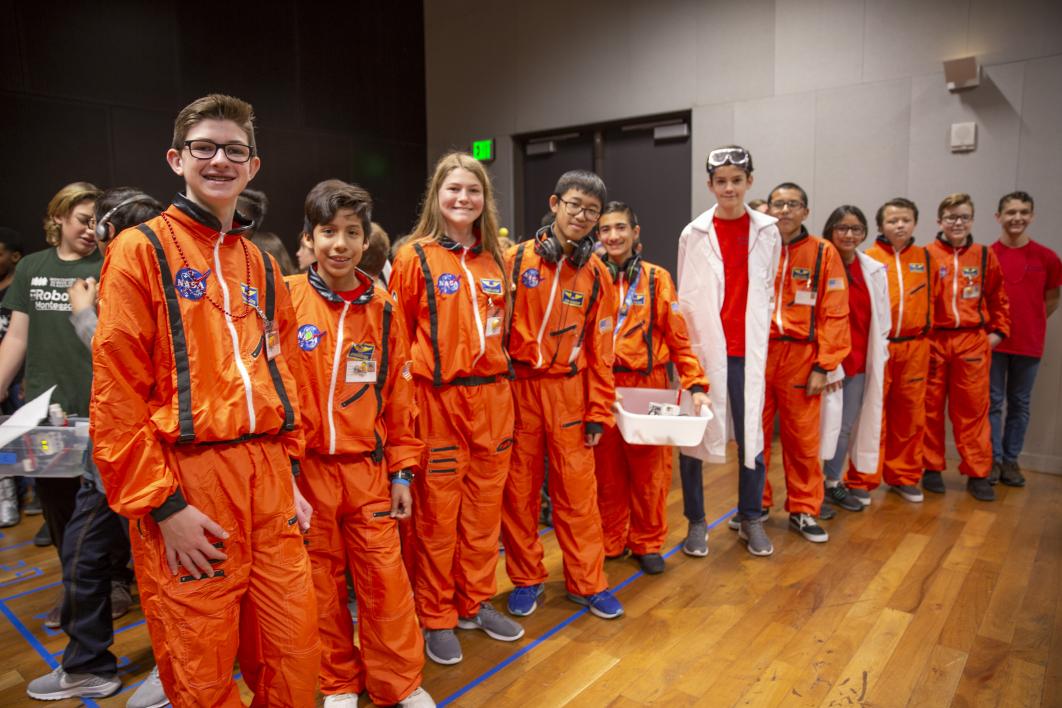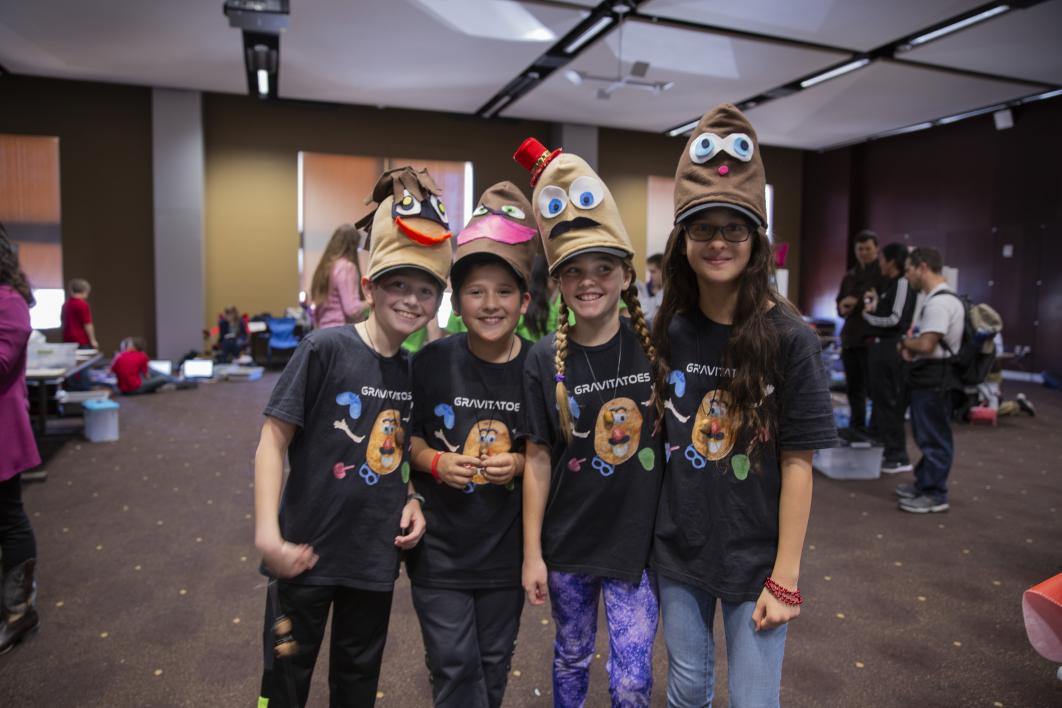Randee Huffman wasn't hanging out at the Arizona FIRST Lego League (aka AZ FLL) state championship tournament during the weekend of Jan. 19–20 because she needed something to fill her time.
“Very busy” is how Huffman describes her life as she finishes classwork needed to graduate this spring with a bachelor’s degree in mechanical engineering from Arizona State University’s Ira A. Fulton Schools of Engineering.
The semester’s tasks include meeting additional requirements as a student in ASU’s Barrett, The Honors College, and the Fulton Schools’ Grand Challenge Scholars Program.
Huffman is also a teaching assistant, works part time with the Fulton Schools student outreach operation and is preparing to move to Seattle after graduation to start the engineering job she has already lined up.
Despite her hectic schedule, Huffman says she wouldn’t miss a chance to contribute to furthering the AZ FLL’s educational mission.
ASU mechanical engineering student Randee Huffman was on duty at the AZ FLL state tournament for a second year. After she graduates, Huffman says she plans to be among the university alumni who return as volunteers to help staff the event. Photo by Erika Gronek/ASU
It was the second year she has worked with the growing contingent of ASU students who volunteer to help manage activities at the tournament.
“I’m a big fan of FLL. I signed up as soon as I heard about it,” Huffman said of the opportunity to volunteer at the tournaments. “I plan to come back and do it again as an alum.”
Her sentiments were echoed by some of her fellow ASU students who made up about a quarter of the 175 tournament volunteers — a group that also included teachers, team coaches and mentors, parents and high school students — at the 2018–19 AZ FLL season’s championship competition.
That is an all-time high number of volunteers for the event, up by more than 50 percent from the previous season, according to Hilary Mitchell, a Fulton Schools senior education outreach coordinator.
Seong-Kyung Lim, a senior electrical engineering major at ASU, echoed other students at the tournament when asked why they volunteer their time for the tournament: “It’s so much fun.” Photo by Erika Gronek/ASU
Mitchell is also the affiliate partner of FIRST (For Inspiration and Recognition of Science and Technology), the international youth organization that operates robotics competitions for K-12 students throughout the United States and more than 50 other countries.
The increase in the number of AZ FLL tournament volunteers reflects the expansion of the program since ASU took over as FIRST’s managing partner for Arizona in 2008.
This season about 3,000 fourth- through eighth-grade students on 358 teams from 175 schools throughout the state participated — along with independent community teams. Each of those teams went to one of the 14 regional qualifying tournaments to vie for a place at the state championship.
About 700 students from 95 of those teams earned their way to ASU’s Tempe campus for the season’s final competition.
ASU senior chemical engineering student Tim Otis says working with youngsters involved in AZ FLL for the past three years has been a valuable experience, giving him ideas for his honors thesis project on developing curriculum for effective engineering education. Photo by Erika Gronek/ASU
All of those numbers add up to the continuation of a decade-long boom period for AZ FLL, a climb that has led to the state tournament being stretched out over two days instead of one for the past three years, Mitchell points out.
For the competition, the young students must build and program small robots from a Lego "Mindstorms" kit and then operate the robots in accordance with a series of prescribed maneuvers and tasks.
Students also must apply basic engineering and science methodologies to solving the challenges presented by each season’s project theme.
This year students had to imagine what kinds of potential technical, physical and even emotional problems might confront astronauts traveling in outer space on missions lasting a year or more.
As part of the FIRST Lego League competition, student teams had to imagine what kinds of problems might confront astronauts traveling in outer space on missions lasting a year or more, and propose solutions. One team’s homemade astronaut suits reflected the theme of that challenge. Photo by Erika Gronek/ASU
The space travel idea seemed to capture the youngsters’ imaginations even more than themes from past years, and Mitchell says the excitement exhibited during the tournament seemed to bear that out.
The bottom line for the allure of AZ FLL? “It’s fun,” she said.
ASU students also say the fun factor is a big part of what attracts them to join the ranks of volunteers.
Senior electrical engineering student Seong-Kyung Lim has been volunteering to help out at AZ FLL tournaments throughout her four years of studies in the Fulton Schools. Her interest evolved from competing in FIRST competitions in high school.
“It’s so much fun to see the kids get all excited and to see the robots they build,” Lim said. “The kids are super-smart and passionate, and they are really cute.”
FIRST Lego League teams are known for their creative names and costumes, as illustrated by members of the Gravitatoes team. Photo by Erika Gronek/ASU
Tim Otis, a senior chemical engineering student, says he has a passion not only for engineering but for both robotics and education. He has been a student worker for Fulton Schools K–12 education outreach programs for the past three years. It was his third year as an AZ FLL tournament volunteer.
Otis is doing his Barrett honors thesis on engineering education. Working with the FLL students “is great experience that I can use for the engineering curriculum I’m developing as part of my thesis," he said.
The FLL competitions provide a good vantage point from which to learn what motivates young students to pursue knowledge about science and engineering, Otis says.
“It’s great to see so many kids thrilled about STEM (science, technology, engineering and math),” said Fulton Schools alumnus Rick Kale, who for the past five years has been helping run the AZ FLL annual regional qualifying tournament at ASU’s Polytechnic campus.
The 2013 aerospace engineering graduate — a reliability, maintainability and system safety engineer for Honeywell Aerospace — has been a volunteer for FLL tournaments since 2009. Kale also was a member of a FIRST robotics team in high school.
He expects to stay involved in AZ FLL for years to come.
“A lot of the volunteers and team coaches and mentors are coming back year after year. So there’s a camaraderie that happens,” Kale said. “It’s like an FLL community that gets together once a year” at the state tournament.
Kale says he also expects that in the future he will be seeing some of today’s young AZ FLL competitors “sitting on the other side of the desk,” from him, applying for jobs as engineers.
Dana Zazick, a 1999 ASU graduate with degrees in mathematics and nonprofit management, was doing double-duty at the recent two-day championship tournament.
On the second day of the event Zazick had to be in her role as coach of the Catholic Master Builders, a team of home-schooled students from Mesa and Gilbert that took first place in the 2017–18 AZ FLL season championship. Zazick has been coaching FIRST teams for five years, including those competing in high school-level competitions.
But on the first day of the tournament she had volunteered to help keep the competition events running smoothly, which gave her the opportunity to take in the vibrant scene of youthful enthusiasm in action.
“It’s just so neat to see all the different kids,” Zazick said, “and to see them pumped up and having a blast.”
The top-performing teams at the 2018–19 Arizona FIRST Lego League state championship tournament were the Firebots and the Desert Coders, both community teams from Scottsdale. As the first-place winner, the Desert Coders will go on to one of the FIRST U.S. Championship events in Houston in April. The Firebots will compete in the Legoland Open in Carlsbad, California, in March.
Sponsors of the Arizona FIRST Lego League are the Ira A. Fulton Schools of Engineering, Intel, Republic Services, Cisco, The Gary & Diane Tooker Family Foundation, Time Warner Cable, Raytheon and Salt River Project.
Read more about Arizona FIRST Lego League competitions
Fulton Schools building community of young learners through Arizona FIRST Lego League
Arizona FIRST Lego League tournament unleashes youngsters’ creative drive
Top photo: The growing Arizona FIRST Lego League sent 95 teams of young students to the recent state championship tournament at Arizona State University’s Tempe campus. About 700 students participated in the competition that tests skills in robotics and the fundamentals of engineering design and problem solving. The league and the tournament are organized and managed by ASU’s Ira A. Fulton Schools of Engineering. Photo by Erika Gronek/ASU
More Science and technology

Cracking the code of online computer science clubs
Experts believe that involvement in college clubs and organizations increases student retention and helps learners build valuable social relationships. There are tons of such clubs on ASU's campuses…
Consortium for Science, Policy & Outcomes celebrates 25 years
For Arizona State University's Consortium for Science, Policy & Outcomes (CSPO), recognizing the past is just as important as designing the future. The consortium marked 25 years in Washington, D…

Hacking satellites to fix our oceans and shoot for the stars
By Preesha KumarFrom memory foam mattresses to the camera and GPS navigation on our phones, technology that was developed for space applications enhances our everyday lives on Earth. In fact, Chris…
